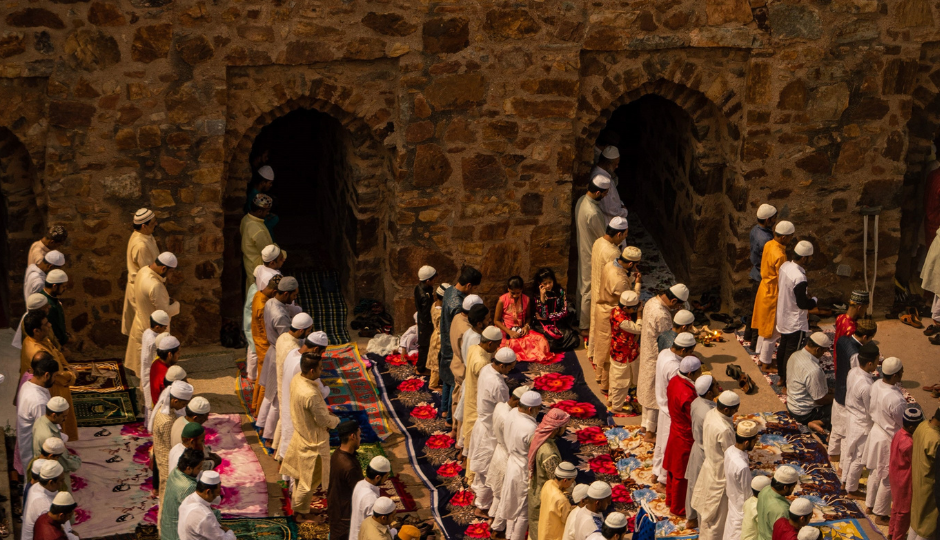
This summer, the Practicum gave me the opportunity to visit the Middle East/North Africa region. While I was there, I witnessed the second-biggest holiday in Islam: Eid. If you look at the passage in the Qur’an that Eid is based on, you’ll recognize similarities to the story of Abraham and Isaac. But if you’re paying attention, you’ll realize it conveys a very different meaning to Muslims.
As Christians, we see in Genesis 22 the beginnings of a sacrificial system that atoned for the sins of God’s people before the ultimate sacrifice, Jesus Christ. Muslims of course don’t believe in such a thing. Each year on Eid, every family sacrifices a sheep, ram, or cow. The exact reason for the sacrifice is not clear. Some will say, “Abraham sacrificed, he was holy, and so we must do the same.” Or: “We give one-third of our meat to the poor, so this is our time to help them.” They’re trying to come up with a reason for what they’re doing without having a god that set up a sacrificial system. Why would the god of the Qur’an call Abraham to sacrifice if not to atone for sin? Why would he call present-day Muslims to sacrifice?
On the morning of Eid, we went out at 7:00am to watch the sacrifices. We witnessed people setting off fireworks. We saw carnival rides that had been brought in and lined up beside the streets and under bridges. Music was blasting from large speakers sitting in the backs of trucks. All of this happened while men walked around in gallabayas that used to be pure white but were now stained blood red. The butcher shops were overwhelmed with animals lined up in rows and gathered into pens. Men with water hoses were constantly trying to wash away the blood as it filled the streets. The sights and smells were almost more than I could bear. But children and families ran around gleefully playing and watching the spectacle with ease.
I kept thinking about what had to happen for thousands of years before Jesus came. Sacrifices had to be made every day for the same sins I commit. I kept thinking of the common saying, “Jesus’ blood was spilled for us.” I never truly had to reckon with what that meant—or certainly what that looked like—until that day when I saw gallons of real blood spilling through the streets. The weight of my sin fell so heavily on my mind, and I sat through the rest of the day in sober gratitude for my savior, Jesus. He endured the spilling of his blood for my sin.
After that day, I truly understood the immense difficulty of sharing the gospel. Islam is one of the most dangerous religions because it belittles sin and therefore belittles our Savior. It makes sin something that can be conquered in our own strength. It’s something God is not that concerned about—he’ll simply weigh it in light of our good works when we die. Can you imagine how tiring it would be to live that way? With no guarantee of salvation?
Islam teaches that god does not care for humanity enough to interact with our lives. It encourages people to depend on their own strength to save them. It encourages them to turn away from Jesus. A religion without Jesus cannot save. It’s hopeless.
The Practicum grew my love for the gospel by growing my love for the sacrifice of Jesus. It’s so easy as a Christian in America to ignore the real cost of sin. After spending time in a country that still sacrifices animals, I was reminded that I can’t gain favor in the eyes of God without Christ. The gospel is beautiful because it reminds me how big my sin is, and how much I need Jesus. Even more, the gospel is beautiful because it reminds me that I have a Savior who truly loves me. He didn’t leave me to deal with sin on my own. He left the glories of Heaven and took on flesh, ultimately dying a death that I could never imagine. What a love. What a cost.
I pray the people of Middle East/North Africa will have their eyes opened and their hearts softened to see that the chasm between them and their God is too wide. They cannot cross on their own. Their good works simply aren’t enough.
Want More Content Like This?
We will deliver Reaching & Teaching articles and podcast episodes automatically to your inbox. It's a great way to stay on top of the latest news and resources for international missions and pastoral training.
